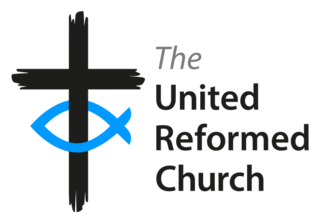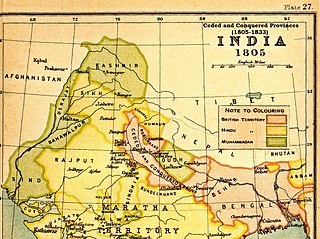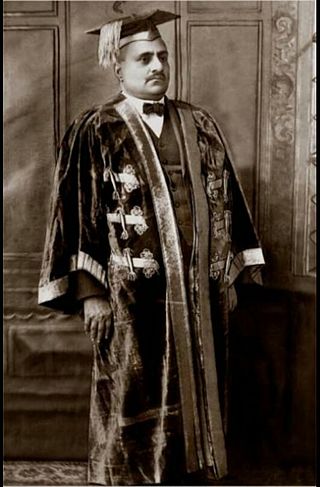
The United Reformed Church (URC) is a Protestant Christian church in the United Kingdom. As of 2024 it had approximately 44,000 members in around 1,250 congregations with 334 stipendiary ministers.

The United Provinces of Agra and Oudh was a province of India under the British Raj, which existed from 22 March 1902 to 1937; the official name was shortened by the Government of India Act 1935 to United Provinces (UP), by which the province had been commonly known, and by which name it was also a province of independent India until 1950.

A united church, also called a uniting church, is a denomination formed from the merger or other form of church union of two or more different Protestant Christian denominations, a number of which come from separate and distinct denominational orientations or traditions. Multi-denominationalism, or a multi-denominational church or organization, is a congregation or organization that is affiliated with two or more Christian denominations, whether they be part of the same tradition or from separate and distinct traditions.

The Church of South India (CSI) is a united Protestant Church in India. It is the result of union of a number of Protestant denominations in South India that occurred after the independence of India.

The Church of North India (CNI) is the dominant united Protestant church in northern India. It was established on 29 November 1970 by bringing together most of the Protestant churches working in northern India. It is a province of the worldwide Anglican Communion and a member of the World Methodist Council and the World Communion of Reformed Churches. The merger, which had been in discussions since 1929, came eventually between the Church of India, Pakistan, Burma and Ceylon (Anglican), the Methodist Church, Disciples of Christ, and some congregations from the United Church of Northern India.

The United Presbyterian Church of North America (UPCNA) was an American Presbyterian denomination that existed for one hundred years. It was formed on May 26, 1858, by the union of the Northern branch of the Associate Reformed Presbyterian Church with the Associate Presbyterian Church (Seceders) at a convention at the Old City Hall in Pittsburgh. On May 28, 1958, it merged with the Presbyterian Church in the United States of America (PCUSA) at a conference in Pittsburgh to form the United Presbyterian Church in the United States of America (UPCUSA).
The World Alliance of Reformed Churches (WARC) was a fellowship of more than 200 churches with roots in the 16th century Reformation, and particularly in the theology of John Calvin. Its headquarters was in Geneva, Switzerland. They merged with the Reformed Ecumenical Council in 2010 to form the World Communion of Reformed Churches.
The Anglican Church of India (ACI) is a union of independent Anglican churches in India. It is not currently a member of the worldwide Anglican Communion whose titular leader is the Archbishop of Canterbury.
The Malavas or Malwas were an ancient Indian tribe. They are believed to be the Mallian people (Malloi) who lived in the Punjab region at the time of Alexander's invasion in the 4th century BCE. Later, the Malavas migrated southwards to present-day Rajasthan, and ultimately to Madhya Pradesh and Gujarat. Their power gradually declined as a result of defeats against the Western Satraps, the Gupta emperor Samudragupta, and the Chalukya emperor Pulakeshin II.
Protestants in India are a minority and a sub-section of Christians in India and also to a certain extent the Christians in Pakistan before the Partition of India, that adhere to some or all of the doctrines of Protestantism. Protestants in India are a small minority in a predominantly Hindu majority country, but form majorities in the north-eastern states of Meghalaya, Mizoram and Nagaland. They are also significant minorities in Punjab region, Konkan region, Bengal, Kerala and Tamil Nadu, with various communities in east coast and northern states. Protestants can trace their origins back to the Protestant Revolution of the 16th century. There are an estimated 20 million Protestants and 16 million Pentecostals in India.
Mizoram Presbyterian ChurchSynod is the largest Christian denomination in Mizoram, northeast India. It was a direct progeny of the Calvinistic Methodist Church in Wales. It is one of the two churches founded by the missionaries and is now one of the constituent bodies of a larger denomination Presbyterian Church of India (PCI), which has its headquarters in Shillong, Meghalaya. The administrative body called the Mizoram Synod has its headquarters at Mission Veng, Aizawl. As the first church, it remains the largest denomination in Mizoram.

The Ceded and Conquered Provinces constituted a region in northern India that was ruled by the British East India Company from 1805 to 1834; it corresponded approximately—in present-day India—to all regions in Uttar Pradesh state with the exception of the Lucknow and Faizabad divisions of Awadh; in addition, it included the Delhi territory and, after 1816, the Kumaun division and a large part of the Garhwal division of present-day Uttarakhand state. In 1836, the region became the North-Western Provinces, and in 1904, the Agra Province within the United Provinces of Agra and Oudh.

General elections were held in British India in 1934. The Indian National Congress emerged as the largest party in the Central Legislative Assembly.

General elections were held in British India in 1920 to elect members to the Imperial Legislative Council and the Provincial Councils. They were the first elections in the country's modern history.
General elections were held in British India in November 1923 for both the Central Legislative Assembly and Provincial Assemblies. The Central Legislative Assembly had 145 seats, of which 105 were elected by the public.
North East India Christian Council (NEICC) is a Protestant ecumenical council of North East India, affiliated to the National Council of Churches in India as one of the regional councils in the year 1939.
Diocese of Agra is an Anglican diocese under the Church of North India. Diocese of Agra, within the Church of North India, was constituted by the decision of the Synod Executive of the Church of North India. The new Diocese thus formed comprising the western part of Uttar Pradesh was named the Diocese of Agra. The Diocese's constitution was accepted and adopted by Minutes 76/6 at the first ordinary meeting of the Diocesan Council of the Diocese of Agra which held its session in St. John's College, Agra Hall, on 9 April 1976.








